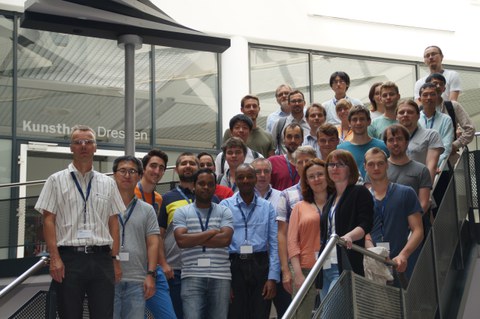Sep 04, 2017
Broken: International Summer School on Topology- and Symmetry-Breaking
From August 14th to 18th, about 40 young researchers from ten countries met at art’otel Dresden for an international and interdisciplinary Summer School hosted by the School of Science. The event entitled “Topological and Symmetry-Broken Phases in Physics and Chemistry – Theoretical Basics and Phenomena Ranging from Crystals and Molecules to Majorana Fermions, Neutrinos and Cosmic Phase Transitions” was made possible due to financial support of the Excellence Initiative and was organised by Prof. Dominik Stöckinger, Prof. Hans-Henning Klauss, and Dr. Paolo Michetti from the Department of Physics and Prof. Thomas Doert from the Department of Chemistry and Food Chemistry at TU Dresden.
Nine internationally renowned scientists could be attracted as lecturers for the Summer School. Their outstanding commitment and their didactically excellently structured lectures significantly contributed to the success of the Summer School.
The introduction into the principles of group theory and their applications in crystallography, solid-state chemistry (Holger Kohlmann, Leipzig) and molecular chemistry (Jens Kortus, Freiberg), were followed by lectures on phase transformations and renormalization groups (Dietmar Lehmann, Dresden) and topology (Jan Budich, Stockholm), symmetry, symmetry-breaking and topology in unconventional superconductors (James Anett, Bristol) and topological aspects in solid state chemistry (Claudia Felser, Dresden). Some of the topics were further illustrated and exemplified in tutorials. Afterwards the topology and symmetry properties of Majorana fermions and neutrinos (Serguey Petcov, Trieste) as well as symmetry-breaking in the Early Universe (Stephan Huber, Sussex) were illuminated before the school terminated with a lecture block on axions in the theory of strong interaction (Joerg Jaeckel , Heidelberg).
The exclusive environment of the art’otel ensured a stimulating but balanced working atmosphere. During the whole week, it was possible to pursue numerous lively discussions in and outside the lecture room. However, besides the classes, a cultural programme ensured the necessary balance. The participants from around the world jointly explored the old city of Dresden and were impressed by the cultural and architectural diversity of the federal state capital. A visit at TU Dresden within the framework of the Night of Excellence completed the program.
At the end of the week, the participants, lecturers as well as organisers were enthusiastic and inspired by the intensive and successful working week and left the conference site feeling enriched by new insights, impressions, and personal contacts.
Written by Prof. Dr. Thomas Doert.

